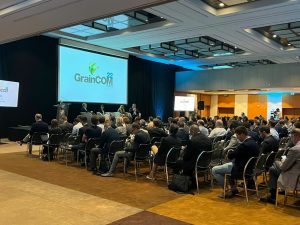Representatives of the Ministry of Agrarian Policy and Food of Ukraine and the Ministries of Agrarian Affairs of Eastern Europe took part in the GrainCom-22 conference, which took place from 17 to 19 May in Geneva, Switzerland. This was reported by the press service Ministry of Agrarian Policy.
The session on strategic concerns and ways to combat them discussed how the current situation in Ukraine affects global agribusiness, prices and trade.
Participants in this panel were: Deputy Minister of Economic Development of Ukraine Taras Kachka, Coordinator of the Delegation to the World Trade Organization (WTO) Maria-Christina Koziy and Senior Supply Chain Officer of the United Nations World Food Program (WTF) Magda Yurkovekha. Moderator – Adviser to the Ministry of Agrarian Policy and Food of Ukraine Roman Rusakov.
Among the main theses presented at the session:
– Ukraine has made significant progress in exporting grain to the EU, but this does not cover pre-war exports. In order for Ukraine to guarantee the world 100% food security and fulfill all contractual obligations, it must restore access to its seaports. Thus, about 1 million tons of grain were exported in April. Even doubling this figure does not compensate for the loss of access to the sea, as seaports allow for the export of up to 6 million tons of grain and oilseeds per month.
– The demand of the international grain market for Ukrainian supplies has increased due to the fact that India has imposed bans on the free export of its wheat.
– It will take Ukraine several years to resume agricultural production due to the damage caused by the war.
According to Taras Kachka, the problem of food security needs political solutions, “the operation Ocean Shield in the Strait of Aden is increasingly mentioned in the context of the problem of unblocking Ukrainian ports.”
“Ukraine will remain in the grain market under any circumstances. This is not a mantra – this is reality. Efforts to simplify logistics between Ukraine and the EU will bear fruit. But the most important thing is that we will be on the market as long as the world of commerce feeds the flow of grain with agreements, “he stressed.
Maria-Christina Koziy stressed that WTO members called for measures within the mandate of the Organization to ensure open, transparent and predictable trade in agricultural products. Members of the organization condemn Russia’s aggression against Ukraine and argue that any obstacles to the export of Ukrainian agricultural products have a negative impact on world markets and global food security.
Magda Yurkovekha stressed that the WFP’s mandate is to fight hunger and prevent food insecurity. In this context, this means supporting the business continuity of Ukrainian farmers. “Therefore, we want not only to buy grain from Ukrainian developers, but also to maximize export opportunities for it, expanding the number of corridors and introducing new or less used by commercial structures,” she said.
She also stressed that the WFP will use its political influence on the international community to address the threat of world hunger due to disruptions in Ukraine’s exports, stressing the need to create conditions for unblocking Black Sea ports.









